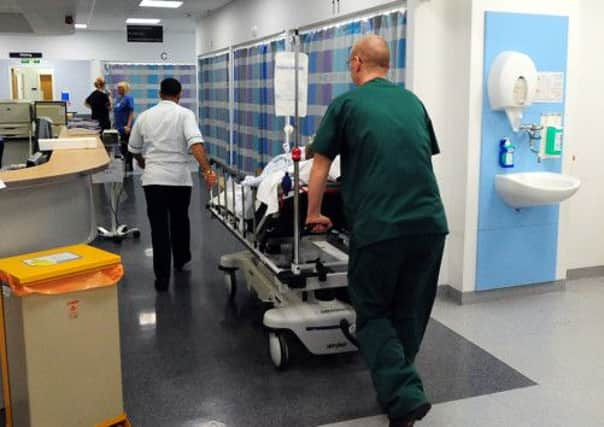Nick Summerton: Put medics, not managers, in driving seat to deliver care where it is needed


After a lengthy discussion it turned out that he was being monitored at home (using tele-medicine) in addition to receiving regular visits from at least three community-based specialist nurses (for heart failure, diabetes and chest problems).
Unfortunately, none of the nurses had been able to interpret all his readings – especially his weight, which appeared to vary widely on a daily basis. Consequently, he was asked to make an urgent appointment to see me.
Advertisement
Hide AdAdvertisement
Hide AdIt was fairly easy to establish that the wildly fluctuating weights arose from the fact that some of the specialist nurses chose to weigh him without his prosthetic leg. What was more difficult to understand, however, was how this poor gentleman had ended up in this tele-medicine and specialist nurse quagmire in the first place – I certainly never referred him and neither did any of my consultant colleagues.
Unfortunately my suggestion, that there are benefits both to patients and to the overall NHS budget in involving doctors when determining which individuals should be monitored by nurses or electronic devices, was greeted with incredulity by our local nurse managers.
To some of us, the NHS is gradually transforming into an extraordinarily inefficient service in which the emphasis is on getting patients to see anyone aside from a doctor – often with individuals being subjected to a variety of parallel services.
The fiasco surrounding the NHS’s non-emergency 111 helpline is an excellent example of this trend, in which patients don’t even get direct access to a nurse, never mind a doctor.
Advertisement
Hide AdAdvertisement
Hide AdAs patients are rather more complicated than a dishwasher, however, it should come as no great surprise that accident and emergency departments are now being clogged up with individuals seeking access to professionals with some degree of medical training and experience.
Nowadays a GP out-of-hours service provides urgent medical care at weekends, evenings, overnight and during Bank Holidays. However, if you require a face-to-face consultation or a visit, there is no guarantee that you will actually see a doctor.
In the past, like many GPs, I delivered out-of-hours care and, despite the impact on our home lives, I think we did a reasonable job. As I was single-handed, I cross-covered with a neighbouring practice and, as a consequence, I was always concerned that my patients should not present a large burden to my colleagues so as not to damage our co-operative working relationship.
Interestingly, and as a direct result of this issue, I focused very tightly on ensuring that my patient care, communications and planning were exemplary in order to avoid any out-of-hours calls occurring due to inadequacies in services I had provided during the day.
Advertisement
Hide AdAdvertisement
Hide AdNot uncommonly, my colleagues never received any visit requests and, on occasions, even phoned up to check my answering phone was working. However, despite all the problems over recent years with the out-of-hours service, I have yet to meet a single NHS manager who understands the added value of an experienced general practitioner as opposed to a specialist nurse in delivering primary medical care.
Over recent weeks both GPs and patients have been blamed for the out-of-hours crisis and the growing pressures on accident and emergency departments. But poorly co-ordinated care, compounded by inadequate decision-making involving insufficient input from experienced doctors, is the root cause of the burgeoning NHS demand. For example, whereas specialist nurses are much better than many doctors in the delivery of tightly focused and protocol-driven services such as endoscopy, problems occur when judgments need to be made in situations of uncertainty.
That being said, I have no difficulty with specialist nurses undergoing further training and I know that there are a number of medical schools that, given the appropriate A-level grades, would be more-than-happy to accommodate them.
Recently I had the opportunity to visit one of my local private hospitals in order to see a close relative. The consultants I encountered clearly recognised their overall responsibility for both the delivery and the co-ordination of patient care and, moreover, the nurses obviously enjoyed nursing.
Advertisement
Hide AdAdvertisement
Hide AdAs a result of this very positive experience, I am now in discussion with this organisation about providing a new private GP service in which, for a small fee, patients could spend up to 40 minutes with an experienced general practitioner (or even arrange a home visit) in order to review and sort out their medical problems and concerns in the form of a “personalised health plan”.
The big challenge for the future will be seeking promote such a doctor-centred service to NHS managers for NHS patients.